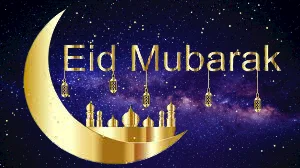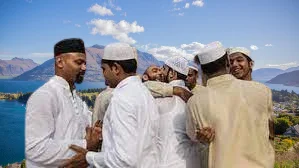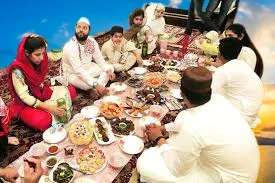Eid ul Fitr also known as the “Festival of Breaking the Fast,” is one of the most important religious celebrations in the Islamic calendar. It marks the end of Ramadan, the month of fasting and spiritual reflection, and the beginning of Shawwal, the tenth month of the lunar-based Islamic calendar. Eid Ul Fitr is celebrated by Muslims around the world with great joy and enthusiasm, and it is a time for family gatherings, feasting, and giving charity. Eid ul Fitr is also referred to as Eid al Fitr or simply Eid.
In 2023, Eid Ul Fitr is expected to be celebrated from Friday, 21 April 2023, to Sunday 23 April 2023, although the exact date may vary depending on the sighting of the moon that day is called Chand Mubarak. The date of Eid is first announced in Saudi Arabia. Muslims worldwide are getting ready to celebrate Eid al-Fitr 2023, as the month-long fasting of Ramadan draws to a close. The date of the Eid varies, depending on the sighting of the moon, and this year, it is expected to begin on Saturday, April 22.
Ramadan takes place for 720 hours i.e. four weeks and two days during which the followers of Islam or Muslims fast between dawn and sunset, pray for peace and guidance, give back to the community in the form of charity or zakaat or engaging in humanitarian activities such as feeding the underprivileged and introspect to enlighten their souls. During the end of Ramadan, intense prayers take place during the Laylatul Qadr or the Night of Power, which is believed to be the holiest night of the year. It generally falls on the 27th day of Ramadan and is a commemoration of the night when the Quran was first revealed to the Prophet Muhammad.

Eid ul Fitr 2023
Eid ul Fitr 2023 in India is expected to be celebrated on Thursday, Friday, April 21, or Saturday, April 22, 2023, subject to the sighting of the moon. If the crescent moon is not seen, Ramadan will be extended for another day.
If the new moon is visible (called Chaand Raat), then Eid will be celebrated the following day. Otherwise, Muslims will fast for one more day to complete the 30-day month. The announcement of the Eid is made via television, radio stations and mosques once the sighting of the moon has been confirmed.
At the end of the last day of Ramadan, Chaand Raat marks a celebratory time where families and friends gather in open areas to spot the new moon. Once the new moon is sighted, people exchange greetings by saying “Chaand Raat Mubarak” and celebrate Eid on the following day.
One of the most prominent festivals of the Islamic community, Eid ul Fitr or Eid al Fitr is celebrated widely all over the globe. On this day, the holy month of Ramadan i.e., a month-long-period of fasting comes to an end for the Muslim community. The festival falls on the first day of the tenth month of the Islamic calendar i.e., Shawwal which is observed when the moon of that day is sighted.
Also known as ‘Meethi Eid’, it is celebrated by distributing home-made sweet, ‘Seviyan’, prepared with vermicelli dipped in sweetened milk and dry-fruits.
Eid ul Fitr or ‘Sweet Eid’ was originated by Prophet Muhammad and is being celebrated by the Muslim community for many centuries. The day is observed as the first day of the month of Shawwal which comes right after the conclusion of Ramadan i.e., the ninth month of the Islamic calendar. The fast of Ramadan (Ramazan) expresses the basic values of the Islamic community including empathy for the poor, charity, worship, steadfastness and patience; it comes to an end on ‘Meethi Eid’.

According to the Islamic calendar, Eid ul Fitr begins when the first ray of light from the crescent moon of the first day of Shawwal falls on the ground. And if the moon is not sighted due to weather conditions issues then Eid is observed on the following day.
History & Sigfnificance
Eid Ul Fitr is a significant Islamic festival that marks the end of the holy month of Ramadan, which is the month of fasting observed by Muslims around the world.
Islamic tradition states that it was during Ramadan, on the “Night of Power” (Laylat al-Qadr)—commemorated on one of the last 10 nights of Ramadan, usually the 27th night—that God revealed to the Prophet Muhammad the “Quran”, Islam’s holy book, “as a guidance for the people.” For Muslims, Ramadan is a period of introspection, communal prayer in the mosque, and reading of the Quran. God forgives the past sins of those who observe the holy month with fasting, prayer, and faithful intention.
The end of the Ramadan fast is celebrated as Eid al Fitr, the “Feast of Fast-Breaking,” which is one of the two major religious holidays of the Muslim calendar (the other, Eid al-Adha, marks the end of the hajj, the pilgrimage to Mecca that all Muslims are expected to perform at least once in their lives if they are financially and physically able)
Eid al Fitr is a time of official receptions and private visits, when friends greet one another, presents are given, new clothes are worn, and the graves of relatives are visited.
Celebrations
The Eid prayer ( Salat al-Eid ) is performed by the congregation in an open area such as a field, community center, or mosque. It is forbidden to fast on the Day of Eid, and a specific prayer is nominated for this day. As an obligatory act of charity, money is paid to the poor and the needy (Zakat-ul-fitr) before performing the ‘Eid prayer.
Around 20,700 mosques and outdoor prayer areas across Saudi Arabia have been prepared and equipped with safety measures for the Eid al-Fitr prayer.
“Zakat al-fitr,” or the duty to give to the poor on this day, is a requirement for every Muslim who has the means to do so. Zakat al-fitr is done so that poor people may receive the resources to take the day off from work and participate in Eid, as well.

Imams (Muslim spiritual leaders) hold special Eid prayers in the early morning of the holiday, usually at a large central mosque, an open field, or a stadium. Everyone is urged to participate in Eid prayers, including children. After the prayer is completed, worshippers embrace each other and say “Eid Mubarak,” or “Blessed Eid,” to wish each other good will. The event ends with a sermon by the imam.
During Eid, one of the most common things you’ll hear people say to one another is “Eid Mubarak!” This literally means “blessed Eid” and is a way of expressing celebration. You might also hear “Eid sa’id” which means “happy Eid”.

Other countries have different greetings though. In Nigeria, people are likely to say “Balla da Sallah”, which is the Hausa for happy Eid. In Malaysia, Eid is called Hari Raya, so to wish someone a happy Eid, you would say “Selamat Hari Raya”.
People wear their best clothes and perfumes or colognes on both holidays, and take a bath or shower to clean themselves before they attend prayer.
There are no requirements for the food to eat (other than following halal), but regional traditions include dates, halwa, falooda, cookies with milk, baklava, and vermicelli noodles.